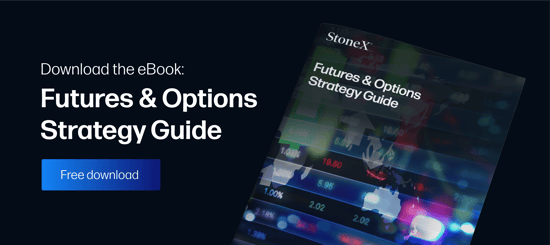In the live futures markets, a trader has two basic choices: buy or sell. When you buy a futures contract, you are “going long” the market in the hopes that prices will rise. For most people, this is the traditional, intuitive mode of capital investment.
But what does it mean to short a futures contract? Read on to learn more about when selling futures may be your best course of action.
Buying vs. Selling
Here’s a brief look at the functionality of buying and selling:
Buy
When you buy a commodity futures contract, you’re making a commitment to assume possession of an underlying asset on a forthcoming date in time. For instance, if you purchase one lot of West Texas Intermediate (WTI) crude oil, you’re pledging to take delivery on 1,000 barrels of oil at contract expiry. If prices rise above your entry point, you’re in a position to profit, but if they fall, an unrealized loss is created.
Sell
In the event that you sell a commodity futures contract, you are pledging to produce a given quantity of the underlying asset at contract expiry. To illustrate, assume that you sold one lot of WTI crude oil. That means you’re on the hook for producing 1,000 barrels of WTI at contract settlement. Should prices fall beneath your contract purchase price, you are positioned to profit, but if they rise, you’re responsible for the unrealized loss.
As you can see, the buy/sell dichotomy is wide. On the buy-side of the equation, the goal is simple: buy low and sell high. The sell-side is a bit more complex. Let’s take a closer look at what it means to short a futures contract and break down a few strategic implications.
What Does It Mean to Short a Futures Contract?
From a functional standpoint, traders have several reasons to actively sell or “short” a futures contract:
- Exit a long position: Traders can use sell orders to offset buy orders and exit open long positions. They are typically positioned as profit targets (above entry) and stop losses (below entry).
- Secure bearish market exposure: When you’re net-flat and send a sell market order or sell limit order to the exchange, you’re actively shorting the market. This is a bearish strategy and one that secures downside market exposure. As long as price falls beneath the trade’s entry point, you profit—it’s that simple.
Strategically, there are a vast array of reasons for shorting a futures market. Here are the most common ones:
- Resistance: A popular means of shorting a commodity futures market is selling a valid resistance level. Common resistance levels are Fibonacci expansions, Bollinger Bands, and pivot points.
- Trend following: Futures traders frequently sell contracts to get in on a bearish trend. By selling pullbacks in the market, you can attempt to profit from falling prices. One way of accomplishing this objective is to sell from the 38 percent or 62 percent Fibonacci retracement levels.
- Fundamentals: Sometimes, the fundamental picture suggests that a short position is warranted. Breaking news items, economic data releases, or geopolitical events are a few fundamentals that can produce strong selling signals.
So what does it mean to short a futures contract? Simply put, it means to exit a long position or gain bearish market exposure. And that’s one of the great things about futures trading: flexibility.
In other products, such as stocks, mutual funds, and ETFs, it is difficult to gain direct short-side market exposure. High margins, maintenance fees, pattern day trader rules, and tracking errors make it a challenge for retail traders to gain direct bearish exposure. This vastly limits traders’ strategic options and reduces their money-making potential.
Which Is Better: Buying or Selling?
When actively trading futures, the best trade is always the profitable one. No matter what you do—whether it’s by buying or selling—approaching the market with discipline and structure are the keys to making your trades winners.
